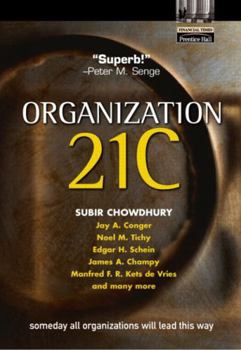Organization 21c: Someday All Organizations Will Lead This Way
Organization 21C brings together wholly original, never-before-published essays by many of the world's leading management thinkers, offering unprecedented insight into the shape of tomorrow's winning organization. The follow-up to the global best-seller Management 21C, this book covers all four elements of organizational success: leadership, process, people, and organizational design. Among the topics illuminated here: the unique challenges of global leadership; James A. Champy's new X-engineering approach to process change across organizational boundaries; Total Rewards Management; the new boardroom and the exercise of power and influence in the 21st century; the sustainability of organizations; and best practices for leading organizational change. The essayists are renowned leaders in business thought from every continent. Like its predecessor, this book will be an indispensable resource for every organizational leader seeking to meet the new challenges of the 21st century.





